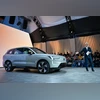Volvo Cars beat second-quarter operating earnings estimates on Thursday but lowered its full-year retail sales forecast citing the impact of European tariffs on Chinese-made EVs that could affect one of its key electric models.
Automakers and suppliers have for years bet on rising demand for electric vehicles, but slowing sales now mean investment in capacity and technology are outpacing demand.
While Volvo Cars has like others reported upbeat EV sales of late, the company on Thursday lowered its forecast for sales growth this year to 12 per cent-15 per cent from 15 per cent.
"We wanted to put a floor on that for the markets to say we're still going to grow but there are some headwinds," CEO Jim Rowan told Reuters.
"It's really driven by tariffs," he said.
Volvo Cars produced 211,900 cars in the second quarter, more than they sold, as demand for electric cars in Europe has dropped. The European Union this month announced tariffs of up to 37.6 per cent on imports of EVs made in China, which is expected to dent demand further.
More From This Section
Brussels has until autumn to make a final decision on the tariffs, which are preliminary for now.
The Swedish carmaker's operating income, which includes its stake in loss-making Polestar, rose to 8 billion crowns ($758 million) from 5 billion crowns a year earlier.
That topped the 6.7 billion crowns expected by analysts, LSEG data showed.
Operating income excluding joint ventures and associates rose to 8.2 billion crowns from 6.4 billion.
The company's battery electric vehicle (BEV) gross margins rose to 20 per cent from 16 per cent in the previous quarter underpinning the CEO's assertion that margins would continue to rise.
(Only the headline and picture of this report may have been reworked by the Business Standard staff; the rest of the content is auto-generated from a syndicated feed.)
(Only the headline and picture of this report may have been reworked by the Business Standard staff; the rest of the content is auto-generated from a syndicated feed.)

)